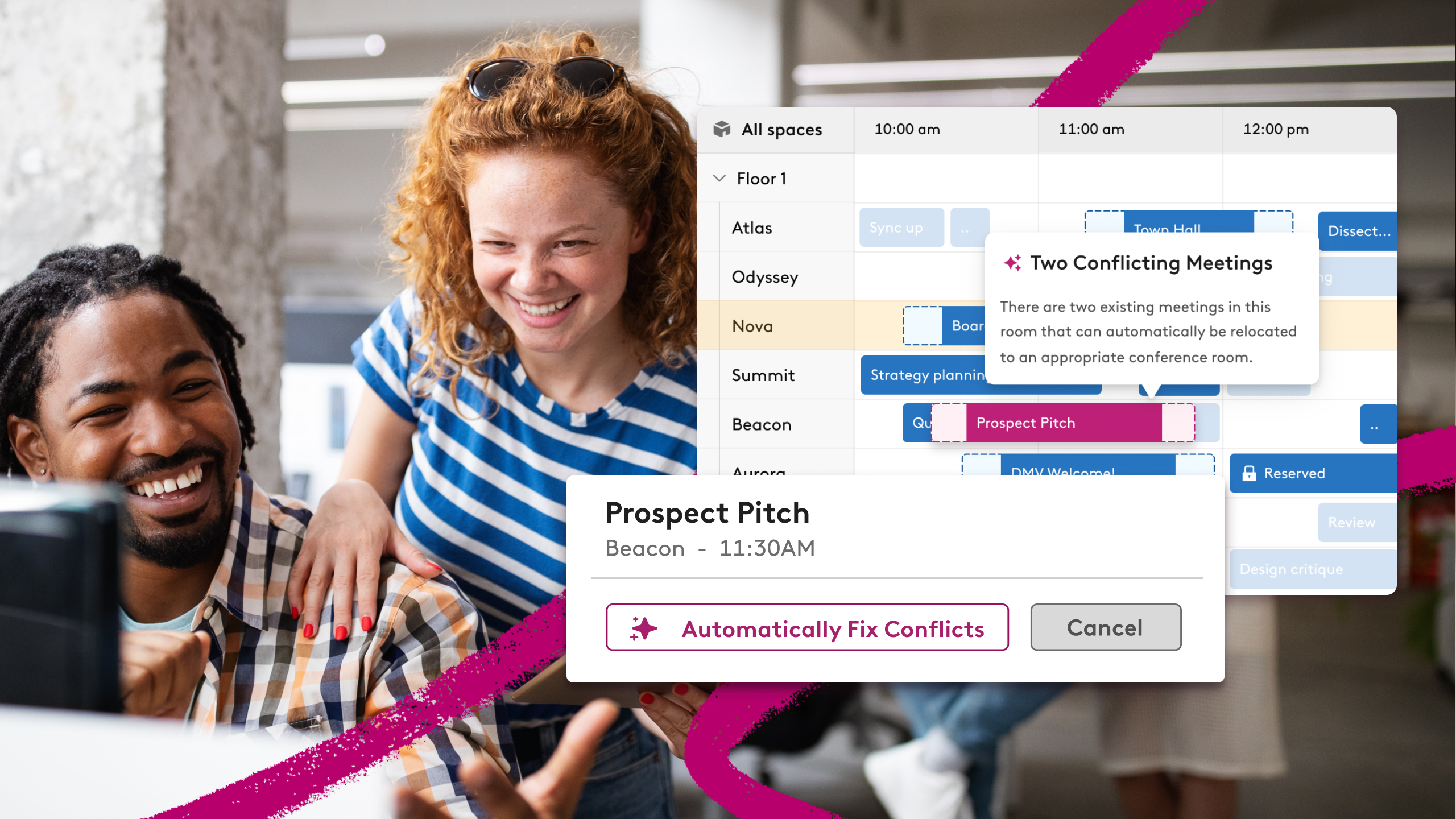What is Office Hoteling for College Campuses?

Office hoteling is one of the many ways teams, faculty and students can reserve spaces on site. This method is often used to increase efficiency and reduce real estate costs for companies.
By sharing workspace and resources, companies can reduce their physical office footprint and save money on rent and utilities. Overall, office hoteling is a flexible and cost-effective way for companies and college campuses to manage their spaces while also accommodating the needs of their people.
What is Office Hoteling?
In the workplace, office hoteling pertains to desks and meeting rooms. Sometimes referred to as desk hoteling or simply ‘hoteling’, this system of booking spaces mimics that of a hotel reservation:
- You reserve a desk or room
- You check into your reservation
- You use the space
- You check out
These reservations are often handled with office hoteling software and workplace admins can set permissions around who can book, when they can book and how the booking gets done.

How is hoteling different from hot desking?
If that sounds similar to hot desking, that’s because it is. The difference, however, lies in the length of the reservation. Hot desking refers to short-term reservations, usually a day at a time. Hoteling refers to longer-term reservations, allowing people to book a desk or space for multiple days, weeks or even months.
Hoteling can be particularly useful for out-of-town team members visiting your office space, contractors in need of a temporary space or visiting clients and guests. The length of stay will vary depending on your needs but hoteling is generally defined as any reservation that spans more than 2 days at a time.
What is Office Hoteling for College Campuses?
When it comes to universities, the concept is similar to workplaces but instead of desks we are talking about campus offices for staff, visiting faculty and, sometimes, students.
The need for more flexible spaces came about during the pandemic. With fewer people on campus, universities sought out innovative ways to make the most of existing meeting rooms, offices and other facilities. In some cases, the downsizing of campuses called for more creative uses of the resources at hand.
Whatever the scenario, universities have increasingly adopted room scheduling software to make it easier to manage scheduling of on-campus spaces. Office hoteling is one way to open up spaces on a temporary basis, as needed.
How Does Office Hoteling Benefit Higher Education?

Streamlined room scheduling
Take the friction out of the booking process for both administrative teams and faculty. Previously, managing room reservations required spreadsheets or sign-up sheets. From there, it was on your administrative team to keep track of who would be where, when.
Having an office hoteling system in place removes the need for manual tracking and makes the reservation process less cumbersome for staff and students.
Better utilization of office spaces
When you improve your space management strategy, you open up new possibilities for reducing overhead costs. Office hoteling makes better use of pre-existing spaces by making offices available when they are needed and not in use. Instead of having dedicated rooms for visiting faculty or impromptu staff needs, you can make use of the spaces on your campus that are not currently in use.
Flexible workplace solutions can provide your teams with the analytics they need to understand how spaces are being used and where there are opportunities to optimize your current office utilization rates.
Improved faculty experiences
It shouldn’t be complicated for your people to find and book the spaces they need. Having an office hoteling system in place gives staff the information they need to locate, reserve and make use of the right spaces for their needs.
Having the right room booking software is an important piece of this experience. The best platforms will make it easier for faculty to find what they need via search tools, maps for better office visibility and even interactive floor plans for better wayfinding.

How to Implement Office Hoteling on Your Campus
Clearly, office hoteling can have a big impact on your bottom line - from faculty experience to cost savings. So how can you get started?
Here are five steps to implementing an office hoteling process on your campus:
1. Define your policy
Before you do anything, sit down with the relevant stakeholders and consider what you want your policy to look like. Consider questions like:
- How do you want faculty to go about booking spaces?
- Are there any restrictions on certain offices?
- Do you need to set a maximum reservation length for these longer-term bookings?
Answering these questions should get you well on your way to building a policy that works for your university.
2. Invest in the right platform
If you don’t already have some kind of space management solution, meeting room management software is an important element of any successful office hoteling plan.
The right tools will help you streamline your processes. Whether it’s managing the permissions around certain rooms or making it easier for teams to reserve spaces, getting the right technology in place should be a priority.
Be on the lookout for key features like analytics around utilization rates, user-friendly workflows and customizable booking options.

3. Train your teams
Once you have your office hoteling software set up, it’s time to make sure your faculty and staff know how to use it. Provide resources to your teams so they can reference your instructions as needed.
Typically facility managers will handle this type of training, sometimes involving HR or people teams to ensure the process runs smoothly.
4. Communicate the guidelines
You’ve conducted training on the tool itself, the next step is to make sure your office hoteling guidelines are crystal clear. Take your answers to the questions from step one and create a policy that you can regularly circulate with staff.
Guidelines are usage of meeting rooms, reservation length and restrictions should be front and center so faculty knows what is expected of them.
5. Observe and refine
Now it’s time to sit and watch your plans unfold. Make note of any hiccups in the process and consider how you can overcome those hurdles. Some examples:
- Are visiting faculty having a hard time finding where they need to go? Consider using interactive office maps for better wayfinding across campus.
- Do people find your current booking process to be cumbersome? Introduce the option to book in a mobile app.

Managing Your Spaces More Effectively
As college campuses adapt to a post-pandemic way of working, having the right systems and policies in place to manage office spaces is key.
Office hoteling is just one example of policies that can help streamline the management of campus spaces. To learn more about how you can better run meeting room scheduling at your university, reach out to the Robin team.












